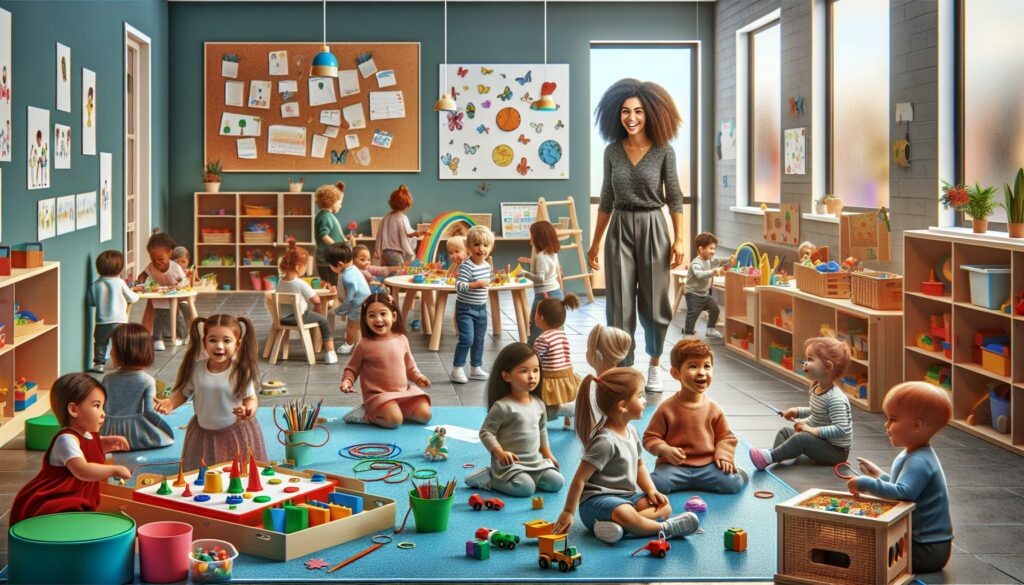When I think about the foundation of a child’s future, early childhood education centers come to mind. These vibrant spaces play a crucial role in shaping young minds, fostering growth, and sparking curiosity. It’s amazing how these centers create an environment where children can explore, learn, and socialize in their formative years.
In today’s fast-paced world, the importance of quality early education can’t be overstated. Parents are increasingly recognizing that the experiences children have in these centers can set the tone for their lifelong learning journey. From nurturing creativity to developing social skills, early childhood education centers are more than just a place to play; they’re a launching pad for future success.
Key Takeaways
- Foundation for Future Learning: Early childhood education centers play a vital role in shaping children’s cognitive and social development, setting the stage for lifelong learning.
- Developmentally Appropriate Curriculum: These centers offer structured, play-based learning that promotes critical thinking, creativity, and motor skills through hands-on experiences tailored to individual needs.
- Importance of Qualified Educators: Skilled educators create a stimulating environment that fosters exploration and personal growth, ensuring that each child’s learning style is accommodated.
- Parental Involvement: Early childhood education emphasizes the importance of engaging parents in their children’s learning process, enhancing educational outcomes.
- Types of Centers: Families can choose from various types of early childhood education centers, including public, private, Montessori, and alternative approaches, each aligning with different educational philosophies and needs.
- Safety and Supportive Environment: Quality centers prioritize a safe, clean, and nurturing environment, essential for a child’s ability to thrive and explore effectively.
Early Childhood Education Centers
Early childhood education centers play a crucial role in a child’s development. These centers cater to children from birth until age five, offering structured programs designed to promote cognitive and emotional growth. Early childhood education emphasizes play-based learning, allowing children to explore and learn through hands-on experiences.
Qualified educators staff these centers. They create a safe and stimulating environment that encourages exploration. Interaction with peers also helps children develop vital social skills, such as cooperation and communication.
Programs offered by early childhood education centers vary. Common elements include:
- Curriculum: Developmentally appropriate activities tailored to individual needs.
- Assessment: Regular evaluations to track progress and cater to each child’s development.
- Parental Involvement: Opportunities for parents to engage in their child’s learning process.
Research consistently shows that quality early education leads to better academic outcomes and emotional wellbeing. Parents increasingly recognize that enrolling their children in early childhood education centers provides significant advantages as children transition into formal schooling.
Importance of Early Childhood Education
Early childhood education centers play a crucial role in a child’s development. These centers offer unique opportunities for children to grow both cognitively and socially during their formative years.
Developmental Benefits
Developmentally, early childhood education fosters critical skills that shape children’s future. Children engage in structured play that enhances cognitive abilities, such as problem-solving and critical thinking. Programs utilize hands-on activities to promote motor skills and encourage exploration. Regular assessments measure progress, ensuring each child meets developmental milestones. Research from the National Institute for Early Education Research confirms that children in quality programs display improved academic outcomes and higher rates of high school graduation.
Social Skills Enhancement
Social skills enhancement occurs through peer interaction in early childhood education settings. Children learn conflict resolution, cooperation, and effective communication while playing and working together. Structured activities encourage collaboration, helping children understand the value of teamwork. Qualified educators guide these interactions, reinforcing positive behaviors and social norms. According to the Center for the Developing Child, strong social skills developed in early childhood contribute to overall emotional wellbeing and long-term success in both personal and academic spheres.
Types of Early Childhood Education Centers
Various types of early childhood education centers cater to different needs, philosophies, and funding sources. Understanding these categories helps parents choose the right fit for their children.
Public vs. Private Centers
Public centers typically receive funding from local, state, or federal government sources. They often follow specific guidelines, focusing on accessibility, affordability, and quality. Enrollment may be based on need or residency. Private centers, funded through tuition and donations, offer flexible programming and varied curricula. They generally present diverse educational philosophies, allowing parents to choose programs that align with their values.
Montessori and Alternative Approaches
Montessori centers utilize a child-centered approach, emphasizing independent learning and hands-on experiences. The environment is prepared to encourage exploration, with children selecting activities that interest them. Alternative approaches may include Reggio Emilia, which focuses on social interaction and creative expression, or Waldorf, which emphasizes imagination and nature. Each approach supports development through unique methodologies, allowing children to learn at their own pace while fostering curiosity and creativity.
Key Features of a Quality Early Childhood Education Center
Quality early childhood education centers possess several key features that contribute to effective learning and development for young children. Understanding these features can guide parents in selecting the best environment for their children’s growth.
Qualified Educators
Qualified educators form the backbone of a quality early childhood education center. Educators possess relevant degrees and certifications that reflect their expertise in child development. They utilize age-appropriate teaching techniques that respond to each child’s unique learning style. Experienced educators foster supportive relationships with children, enabling them to explore, ask questions, and develop a love for learning. Regular professional development ensures that educators stay current with the latest research and best practices in early childhood education.
Curriculum Design
Curriculum design plays a crucial role in shaping the educational experience at early childhood education centers. A structured, play-based curriculum integrates various learning areas, including language, math, science, and the arts. Learning activities encourage critical thinking, problem-solving, and creative expression. Programs incorporate hands-on experiences, allowing children to explore concepts in real-world contexts. Ongoing assessments track individual progress, ensuring that each child meets developmental milestones, thereby tailoring the experience to support growth.
Safety and Environment
Safety and environment significantly impact a child’s ability to learn and thrive. Quality centers offer secure facilities with childproofing measures and age-appropriate equipment. Indoor and outdoor spaces promote safe exploration and active play. Cleanliness and health standards are strictly maintained to ensure children’s wellbeing. A nurturing atmosphere, characterized by welcoming staff and engaging materials, invites children to feel comfortable and motivated to learn.
Types of Centers
Choosing the right early childhood education center is a crucial step in nurturing a child’s growth and development. I’ve seen firsthand how these centers create a stimulating environment that fosters curiosity and social skills. It’s inspiring to realize that the foundation laid during these formative years can lead to lifelong success.
As parents, we have the power to make informed decisions that positively impact our children’s futures. By understanding the various types of centers and their unique approaches, we can find the perfect fit for our little ones. Investing in quality early education isn’t just about academics; it’s about shaping well-rounded individuals ready to face the world.

